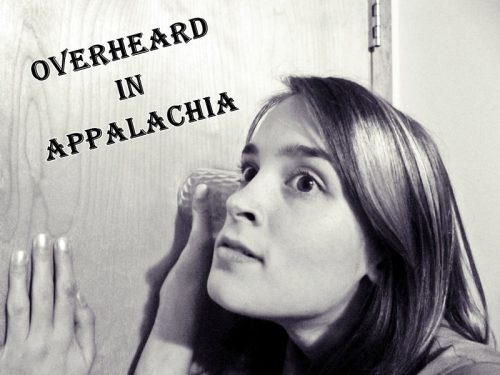
“Did she tell you what we ate for breakfast?”
“No she didn’t name it to me.”
Subscribe for FREE and get a daily dose of Appalachia in your inbox
Overheard: snippets of conversation I overhear in Southern Appalachia

“Did she tell you what we ate for breakfast?”
“No she didn’t name it to me.”
Subscribe for FREE and get a daily dose of Appalachia in your inbox
Overheard: snippets of conversation I overhear in Southern Appalachia

“I made’em up with buttermilk to save my sweet milk. They were still good.” Tipper Overheard: snippets of conversation I overhear in…

“Before you leave I need you to go down to the basement and bring up some jars if you can.”…

“He helped me plant 7 rows of taters and I tell you what when we finished he was hitting the…

“Experience is the best teacher. Even a bad experience teaches you something.” —————————- Tipper p.s. For those pickling along…

“I bet that about killed her momma and daddy. They always thought they were a little better than everybody else,…

“I just want shed of him.” Tipper Overheard: snippets of conversation I overhear in Southern Appalachia Subscribe for FREE and get a…
Good thoughts to ponder from Ron.
Are we talking about “ate” for breakfast or “name it”? I was way up in school before I learned that ate was a word. “What did you eat for supper last night?” I eat a bowl of cornbread and milk. I would of eat more but we run out of milk.” I am still confused about the usage of eat and ate. Which is correct, have you eat yet or have you ate yet?
Ed, try “have you eaten yet?” I love language, which changes, like King James Bible word meanings, but some grammatical forms don’t, or shouldn’t be discarded, in my opinion. I wish newspaper, magazine, and comic strip creators would differentiate between “may I?” and “can I?” but they’re not likely to. “Can I?” now usually serves for both usages–asking permission and whether a thing is physically possible (can you lift that anvil?; can I drive to the store?)
Good Morning Blind Pigs and fellow followers. It’s a fine day in South-Central Pennsylvania, and I’m hoping everyone is enjoying this beautiful fall-like weather (although I’m not yet quite ready for the actual change of seasons.) I remember the beautiful, raw mornings in the country, with the sights, smells, and sounds of farm life. I also remember walking through the countryside on well-worn paths and seeing others along the way. Most often I’d hear, “How are yee” or “did you hear that Joe Weaver is plum down in his back, can’t hit a lick?” I miss the colloquial phrases and the warm, slow speech that sorta wraps itself around you, as only the long-drawn-out speech in Appalachia can do. One thing I miss is also the ability to cut off a twig of Sassafras and chew on it. All those things make up the Appalachia that I remember ( and miss!)
I’m from Eastern Ky… and while I’ve heard a lot of the saying that Tipper talks about, this is a new one for me.
Hope you all don’t lose patience with me. But here is what my pondering has gotten me so far:
When you say, Tipper, that an expression is “beyond common” in your area, one of the results is that you are reinforced in using it yourself. Both to hear and understand it, as well as to use it, are not ‘second nature’ but ‘first nature’; that is, the first way that springs to mind to say that idea. It doesn’t require studying in it, it just is.
And that leads me to two other things. If I were hearing Appalachian talk beyond commonly I do think I would slip right back into it with scarcely a ripple. The instant connection when you or your readers use expressions I heard years ago assures me of that. and it tells me that ‘imprinting’ – if that is the best way to say it – is durable. I won’t outgrow it nor will it fade completely away. Also, it tells me I am not hearing them here where I now live. If I were, they would be much nearer to me regularly saying them; that is, they would stay in ‘first nature’.
Golly gee, been a long time since I heard that phrase “name it to me”. But like so much of what you post, it was instantly familiar. “Name it” was another way to say “tell it” or “say it” and was not necessarily about a proper name, though it could be.
Once again I am reminded however that even though I understand lots of old ways of speaking, I do not use them myself. I find that sad for a variety if reasons, one being that I was changed without realizing it as it was happening. The truth is I probably can’t undo it now. Maybe that is a reason I like the King James version of the bible. I hear the echoes of Appalachian speech in there. Or, more accurately, Appalachian talk has echoes of the KJV. Either way, I had never thought of that before. I’ll need to study on that.
“Count your blessings; name them one by one . . .” says that old hymn.
Overheard my late friend and classmate, Francis Partan, saying, “I am so confused, I don’t know if I am a-warshin’ or a-hangin’ out”…